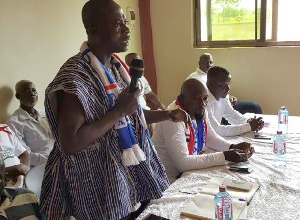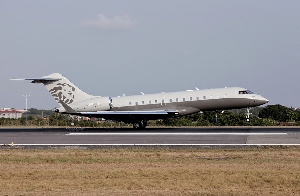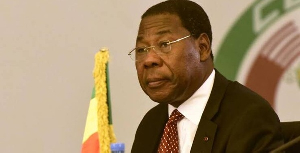The Builsa South District has held a one day Town Hall Meeting on government’s policies and interventions to help in the development and promotion of quality livelihood for the people.
The participants were schooled on the operations of the Planting for Food and Jobs, One Village One Dam, Free Senior High School, the One District One Factory and the National Entrepreneurship and Innovation Plans (NEIP) initiatives among others.
The meeting, which was organized by the Ministry of Information and the Ministry of Local Government at Fumbisi in the Builsa South district of the Upper East Region, was part of government’s effort to involve the people in the decision-making process to foster good governance in the country.
Mr Nelson Mba, the Upper East Regional Director of Information, said the meeting was part of efforts to promote local governance and accountability at the grassroots level and to encourage the people to participate effectively in governance.
He urged the people to participate effectively in the meeting and make their inputs for redress at the central government level to inform government of the immediate needs of the area.
Mr Daniel Kwame Gariba, the District Chief Executive (DCE) of the area, in a presentation, outlined the impetus of government policies on development and said they were geared towards eradicating poverty and providing an enabling environment for human existence.
Touching on the unemployment challenge in the country, he said it was a national security threat “since the devil would always find work for idle hands,” and noted that, only 5,000 out of 250,000 graduates from tertiary institutions find jobs every year.
Mr Gariba said to improve the situation; government introduced the National Entrepreneurship and Innovation Plan (NEIP) to absorb the remaining 245,000.
He explained that the NEIP would create new businesses and grow existing ones to enable them to develop viable and lucrative employment opportunities for the youth.
Mr Gariba said the NEIP would soon train the youth to acquire skills in vegetables and other crop production that would enable them to crop for both foreign and domestic consumption.
He said the Infrastructure for Poverty Eradication Programme (IPEP) would focus on redirecting capital expenditure towards the constituency level as well as infrastructure and economic development priorities with particular emphasizes on rural and deprived communities.
He called on the participants to support government execute the polices, because under the IPEP, each of the 275 constituencies would be given the equivalent of $1,000,000 dollars annually for its developmental projects.
Madam Apobil Asoe, a farmer, called on government to make the free senior high school programme transparent and fair so that the less privileged people would have access to it.
Nab Ignatus Atirekpere Amalugsi, the Chief of Gbedembilisi, urged government to locate the factories at vantage areas, where raw materials would be available or easily accessible.
The Queen Mother for the Waisi traditional area, Madam Lariba Asadiok, commended government for its effort in extending development to the area and urged that the free senior high school policy is maintained to meet the educational needs of the people.
Regional News of Saturday, 16 September 2017
Source: GNA













